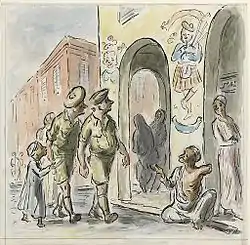Wagh El Birket
Wagh El Birket (Arabic: وجه البركة (here, pronounced with the 'g' and the 'h' separate), lit. "the face of the lake" or "fronting the lake") was, through the first half of the 20th century, the entertainment district (or red-light district) of Cairo, Egypt.[1][2] The lake was where Azbakeya is now.[3]
Wagh El Birket
وجه البركة | |
|---|---|
Entertainment district | |
 Troops in the Birka, 1942 cartoon | |
| Nickname(s): The Berka (WWII) | |
| Country | Egypt |
| City | Cairo |
Events
In the 19th century as Cairo expanded, Wagh El Birket developed as a contact zone between the wealthy area round the Azbakeya lake and expanding central Cairo. The street ran from the Hotel Bristol to Clot Bey Square.[4]
In 1911 the street was described as "the most unblushing in Cairo".[4] On one side was an arcade with cafes underneath. On the other were houses with balconies on the upper floors. "Ladies of the night" dressed in flimsy gowns would display themselves on the balconies. Towards the Clot Bey end was the Fishmarket, a particularly squalid area.[4]
WWI
In World War I there were violent incidents in the Wagh El Birket, including the major incident known as the Battle of the Wazzir.
WWII
During the Second World War, the street was known as "the Berka" by troops.[5] The military set up brothels on the street, which were controlled by the Medical Corps.[6] Medical centres, officially known as PA centres (preventative ablution),[7] to try and prevent servicemen catching STI were set up in the area,[8] and the army medical services oversaw the regular check-ups of prostitutes which were carried out by civilian authorities.[9] The street had warning signs of a cross on a white background at both ends.[10]
After two Australian soldiers were killed on the street,[5] the authorities closed the Berka down in May 1942. Some of the troops blamed General Bernard Montgomery for the closure as he had a reputation as a puritan.[9]
Fiction
The Wagh El Birket features prominently in several novels by Egyptian author Naguib Mahfouz, particularly the Cairo Trilogy. [5]
References
Inline citations
- Moseley 1917, p. 206.
- Dawson 1961, p. 33.
- Tawfik & Ali 2018, p. 114.
- Sladen 1911.
- Richardson 2003, p. 130.
- Thompson2010, p. 50.
- Stout 1954, p. 599.
- Bierman & Smith 2002, p. 42.
- Stone, Andrew (4 April 2009). "NZ's lost city in Egypt". The New Zealand Herald. Retrieved 30 November 2011.
- Palmer et al 1990, p. 172.
Bibliography
- Bierman, John; Smith, Colin (2002). The Battle of Alamein: Turning Point, World War II. Viking. ISBN 978-0-670-03040-8.
- Dawson, W. D. (1961). 18 Battalion and Armoured Regiment. War History Branch, Department of Internal Affairs.
- Flower, Raymond (2002). Napoleon to Nasser: The Story of Modern Egypt. ISBN 978-0-7596-5393-1.
- Moseley, Sydney Alexander (1917). With Kitchener in Cairo. Cassell, Limited.
- Palmer, Roy; et al. (1990). What a Lovely War: British Soldiers' Songs from the Boer War to the Present Day. M. Joseph. ISBN 978-0-7181-3357-3.
- Richardson, Dan (2003). Egypt. Rough Guides. ISBN 978-1-84353-050-3.
- Sladen, Douglas Brooke Wheelton (1911). Oriental Cairo - The City of the Arabian Nights. Jazzybee Verlag. ISBN 978-3-8496-5241-8.
- Stout, Thomas Duncan MacGregor (1954). War surgery and medicine. War History Branch, Dept. of Internal Affairs.
- Tawfik, Mennatallah Said; Ali, Sara Essam (27 November 2018). ""Governance and Public Awareness" Dilemma in the Conservation of Heritage and Cultural Parks in Egypt". Resourceedings. 1 (2): 109. doi:10.21625/resourceedings.v1i2.327.
- Thompson, Peter (2010). Anzac Fury: The Battle of Crete 1941. Random House Australia. ISBN 978-1-86471-560-6.
External links
- Probably the aftermath of the April 1915 riot. Blogger.
- A wrecked hotel in the Birka after the riot. Blogger.
- Riot damage. Blogger.
- "Riot" in the Esbekia". Blogger.